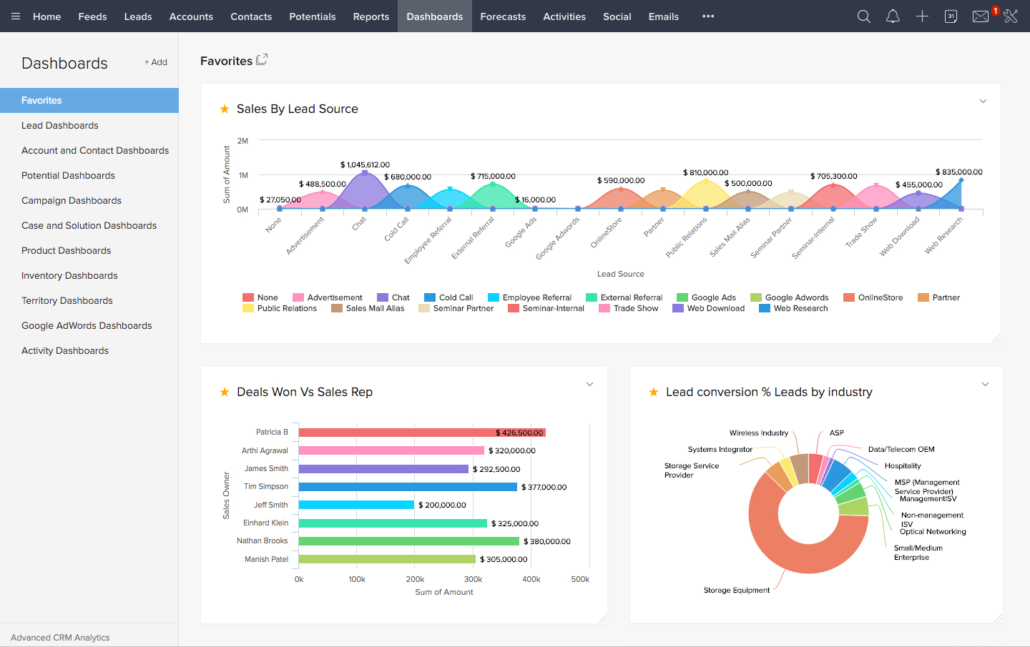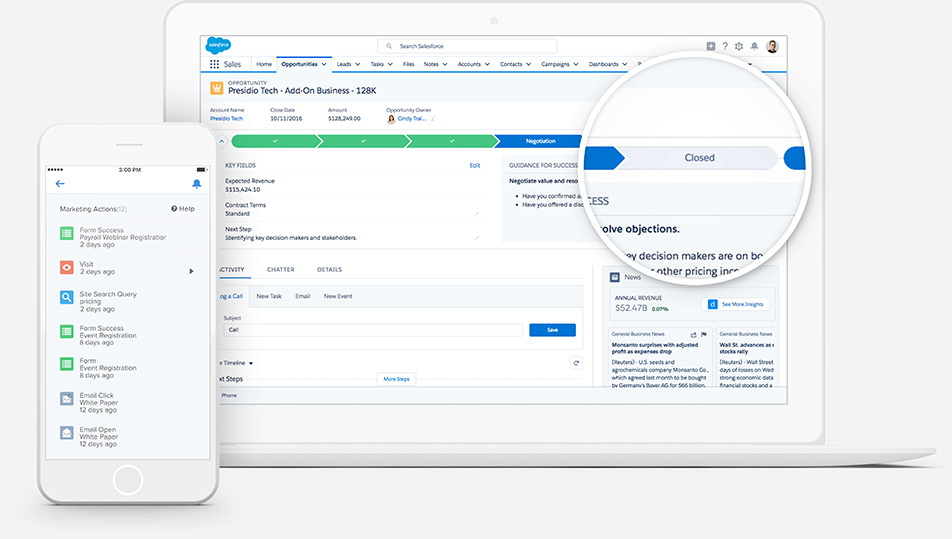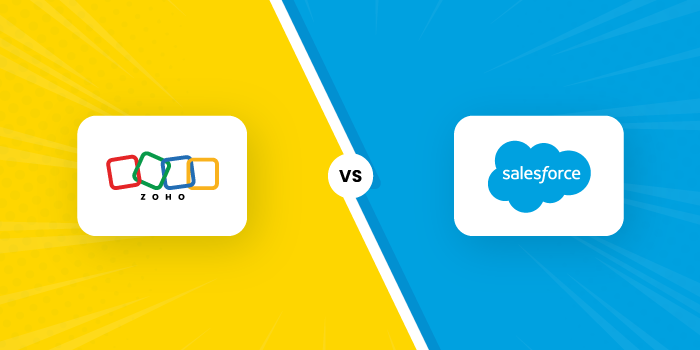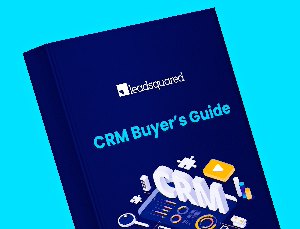Apart from its features, three things are most important in a CRM: scalability, customizability, and pricing.
And there are a variety of CRMs in the market to ensure that you find the right balance, all the way from the nimble and affordable Zoho, to the industry giant Salesforce.
While each CRM has its own advantages, we have taken two CRMS—Zoho and Salesforce as an example to help you choose better.
We have compared them based on features, pricing, scalability, implementation time, which industries they are best suited for, and a lot more so that all you need to decide is decide whether it fits your business process perfectly.
Before we dive straight into comparing the two CRMs, let’s take a deeper look at both Zoho and Salesforce.
What is Zoho CRM?
First built in 2005, Zoho CRM is a part of the Zoho One suite, made to help businesses in lead management, process management, sales force automation, and more. Today, with over 150,000 clients, Zoho caters to mostly SMBs and startups. In fact, over 80% of their clients have less than 200 employees.
Furthermore, this CRM is used by the IT and Computer Software sectors, with developers and administrators mainly using this software. Some of the company’s notable clients include Fossil, Levi’s, and the state government of North Dakota.

Why Zoho is a good choice in the Zoho vs Salesforce debate:
Zoho is an excellent choice for B2B SMBs that don’t want a lot of customizations and have a generic business process, as it is much more affordable when compared to Salesforce.
Furthermore, the CRM is perfect for businesses looking to invest in some of their other products of Zoho One as well, as the CRM integrates flawlessly with different solutions of its own suite.
Then, why do customers go for Zoho alternatives?
While the grass may seem greener on Zoho CRM’s side, here are a few critical shortcomings [SM3] that have led many clients to consider Zoho alternatives.
1. Lack of customer support
One thing you want in every great CRM is good customer service. You don’t want to buy the product, then have to figure out how to use it all by yourself.
Unfortunately, multiple reviews on G2, Capterra, Gartner have talked about how Zoho’s customer support is disappointing. “Their support team is a bunch of absolute pathetic people. Clueless nincompoops who have no training, empathy or understanding of how customer support works,” is what one customer wrote on their horrific experience with the service team.
2. A headache to scale up your existing plan
Now, if lack of customer support wasn’t the only barrier to scaling up with the CRM, upgrading your existing package is tricky. What do I mean by that? Let’s assume you want to add a WhatsApp connector to your current feature package.
Typically, you would just ask the CRM company to help you integrate it and pay the extra amount with your existing package.
However, with Zoho, you need to repurchase an entirely new plan for that.
3. Unreliable and faulty automations
One final feature where this CRM could be improved is great automation. Not only do they not have drip campaign features, but Zoho’s API rates are known to fail for a higher number of leads. This is also one of the reasons that this CRM is better suited for B2B businesses, which generally have a lesser number of leads on average.
And regarding API rates, Zoho allows only a limited number of daily API calls. For example, in its standard package, Zoho allows only 100,000 API credits per day for an entire organization. This means that if you exhaust them, you can’t do any API-related activity, like lead tracking, management, or scoring, until the next day.
Now that you know some of Zoho CRM’s strengths and weaknesses, let’s look at Salesforce next.
What is Salesforce?
Salesforce is one of the first names you hear when looking for a CRM. Being the oldest and most prominent enterprise-catering software in the business, this software is used by 150,000 clients today. It helps businesses by providing extensive integration, high customizability, and in-depth features. Some of Salesforce’s best features include:
- Lead management
- Lead scoring
- Sales forecasting
- Analytics using AI
- In-depth reporting
Next, let’s see whom this software is best suited for.

Why is Salesforce a good choice in the Zoho vs Salesforce debate?
Salesforce tailors each solution according to your business process. Furthermore, you should choose this software if you are a company with over 100,000 employees and want in-depth customizable features to maximize efficiency as much as possible.
Then, why do companies look for Salesforce alternatives?
Sometimes, too many cooks can spoil the broth. Or in this case, too many features can confuse you about what you should do, or which features you need.
“There is a lot that Salesforce can do, and it can be a little overwhelming sometimes. You would be lost if you do not have a Salesforce developer team to help with questions,” is what one reviewer wrote about the CRM’s extensive functionalities.
Furthermore, since the product is tailor-made, the implementation time is long. And we don’t mean weeks, it could take a few months at least!
One final reason businesses look at Salesforce alternatives is that, for such extensive features and customizations, Salesforce charges extra, that is, anywhere from $20 to $120 per hour. This can often be too much for SMBs who don’t have a fortune to spend on such feature-intensive software.
Now that you know the strengths and weaknesses of both software, here is another alternative – LeadSqaured, that is scalable, affordable, and customizable.
LeadSquared – A solution to the Zoho vs Salesforce debate
LeadSquared is an end-to-end sales execution CRM which provides businesses with sales and marketing solutions to help improve their businesses. It does so with the help of individualized solutions for each sector, along with other features like customer segmentation, lead management, lead capturing, workflow automation, and more.
This young company has over 2000 clients today, mainly from the BFSI, health, and education sectors. With a healthy mix of SMBs, start-ups, and enterprise businesses, some of LeadSquared’s notable clients include Manipal Hospitals, Byju’s, Bikes24, and Zoomcar.
Who is LeadSquared suitable for?
LeadSquared is a great fit for businesses that want sales solutions with a wide range of features, lots of customizability, and short implementation times, all at affordable prices.
It caters to businesses of all sizes, regardless of them being B2C or B2B. Furthermore, the CRM also provides out-of-the-box integrations to almost all apps on the market.
Then where does LeadSquared fall short?
This CRM does not provide a customer service and support CRM, so if that’s what you’re looking for, then LeadSquared may not be your first choice. Although it provides integrations with ticketing systems, there isn’t a local solution yet.
Another issue that the company is currently fixing is that the server can be a little slow to use at times.
But apart from that, the CRM is great all-around solutions, especially for sales and marketing.
And that’s some of the strengths and weaknesses of LeadSquared.
To know more on each of these CRMs, below is a comparison table that pits both CRMs against each other, in terms of all functionalities, with an alternative as well.
And it’s completely free to download so that you can share it amongst your peers to make better decisions. Here is the link to download the table – Zoho vs Salesforce Comparison Table.
Zoho vs Salesforce Comparison Table
Zoho CRM | Salesforce Sales Cloud | LeadSquared Sales Execution CRM | |
Pricing |
|
|
|
Free trial availability | A free trial is available for 15 days. | A free trial is available for 30 days. | A free trial is available on request. |
Implementation time | 14 to 35 days | 35 to 335 days | 5 to 15 days |
Best Features |
|
|
|
Available on: | |||
Devices | Both desktop and mobile | Both desktop and mobile | Both desktop and mobile |
Mobile OS | Both Android and iOS | Both Android and iOS | Both Android and iOS |
Search Engines | Chrome, Edge, and Firefox | Chrome, Edge, and Firefox | Chrome, Edge, and Firefox |
Languages supported | Support languages like English, Finnish, Greek, Czech, and more. | Support languages like French, German, English, Italian, and more. | Supports languages like Hindi, English, Indonesian, and more. |
Customizations | Provides minimal customizations. You can customize the reports and certain lead fields | Highly customizable. You can customize each aspect of the CRM, including the sales pipeline, UI, and sales process. | Highly customizable. |
Scalability | It is difficult to scale with Zoho because of the difficulty in integrating with third party applications and limited customization. | Features essential for scaling are only provided at higher-priced packages, making them unaffordable for SMBs. | LeadSquared is scalable as it provides tons of integrations, lots of customizations, and is affordable. |
Customer support | The following customer support is provided:
| The standard package includes:
Features like expert coaching sessions and 24/7 support are available at additional costs. | All packages include:
|
User Feedback: | |||
Positives: |
| ||
Negatives: | Insert Custom HTML | Occasionally slow to use | |
Now if you feel like neither CRMs in the Zoho vs Salesforce discussion is for you, then you might want to look at a few other CRMs.
But going through each software’s pros and cons can be pretty tiresome. Furthermore, it’s going to be really time-consuming.
Therefore, to help you speed up your search process, here are two resources we have for you.
Resources that will help choose the perfect CRM:
- Top 17 CRM Tools for 2023 [Features, Reviews & Ratings] – This list here will give you a quick overview of each CRM and let you know their strengths and weaknesses. This will help you shortlist a bunch of other CRMs that you feel are good fits for your business.
- CRM Evaluation Checklist – Now, if you feel like you want to look at other CRMs apart from the ones on our list or evaluate each one in more detail, then you can download this checklist, which contains a list of all important tasks and background research you should do.
And if you want to look at a few more comparisons, then here is a list of other ones in this series:
Final thoughts on the Zoho vs Salesforce debate.
Now, while some CRMs are really vast in features and scalable, they are expensive (like HubSpot, Salesforce, and SAP).
For example, if you bought Salesforce’s Unlimited plan for 50 users, then the cost would be $15,000. Additionally, let’s say you pay $100 per hour for customizations, and they work 4 hours a day. By the end of 40 to 50 days, you would have spent another $16,000 – $20,000!
On the other hand, there are affordable CRMs like Zoho, Insightly, Keap, etc. aren’t really scalable, which means you will need to change it after a certain point.
This means searching and reinvesting in a new software, having your reps relearn handling the new UI, and again waiting weeks for implementation.
Which is why we come back to the point stressed in the first line of this blog – the importance of finding a balance between number of in-depth features, scalability, and affordability.
One such CRM which has a great balance between affordability, features, and scalability is LeadSquared. With great customer support and tailored solutions, we fit all businesses, whether you are SMBs or large enterprises. You can get in touch with our sales reps to know more about how our solutions help your businesses grow.
FAQs
While there are a lot of differences between the two, the main dissimilarity is that Zoho CRM is better-suited for SMBs while Salesforce is more for enterprise-sized businesses.
Salesforce is a better option for large-sized businesses that want a highly scalable and feature-extensive solution.
Yes, you can integrate Zoho’s ticketing system with Salesforce.











